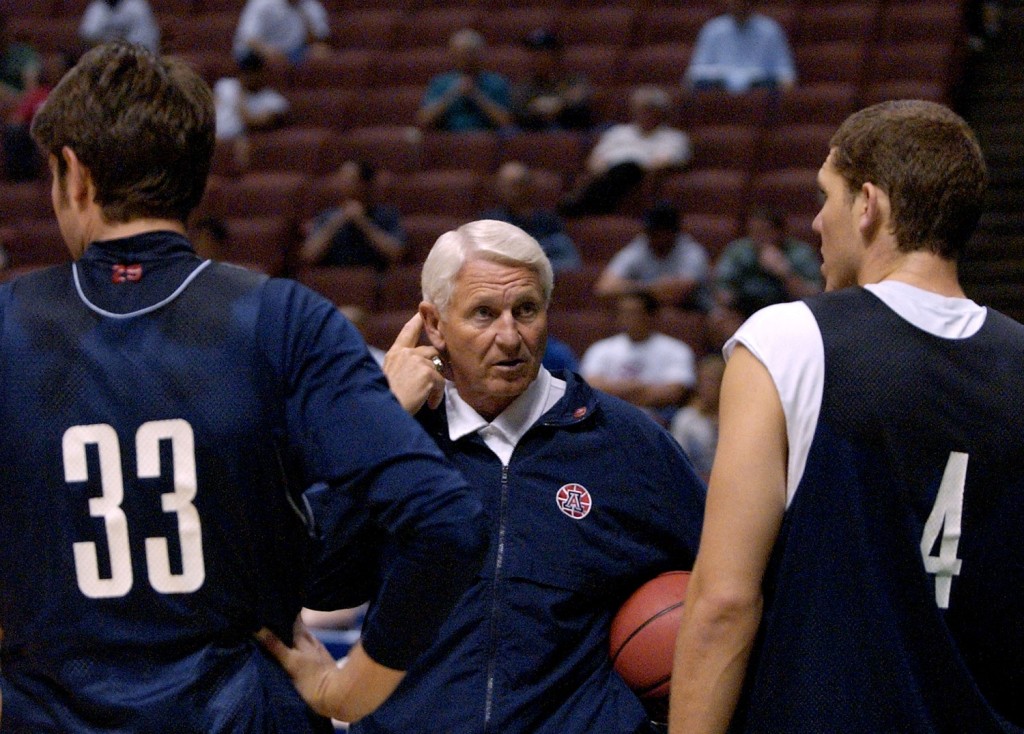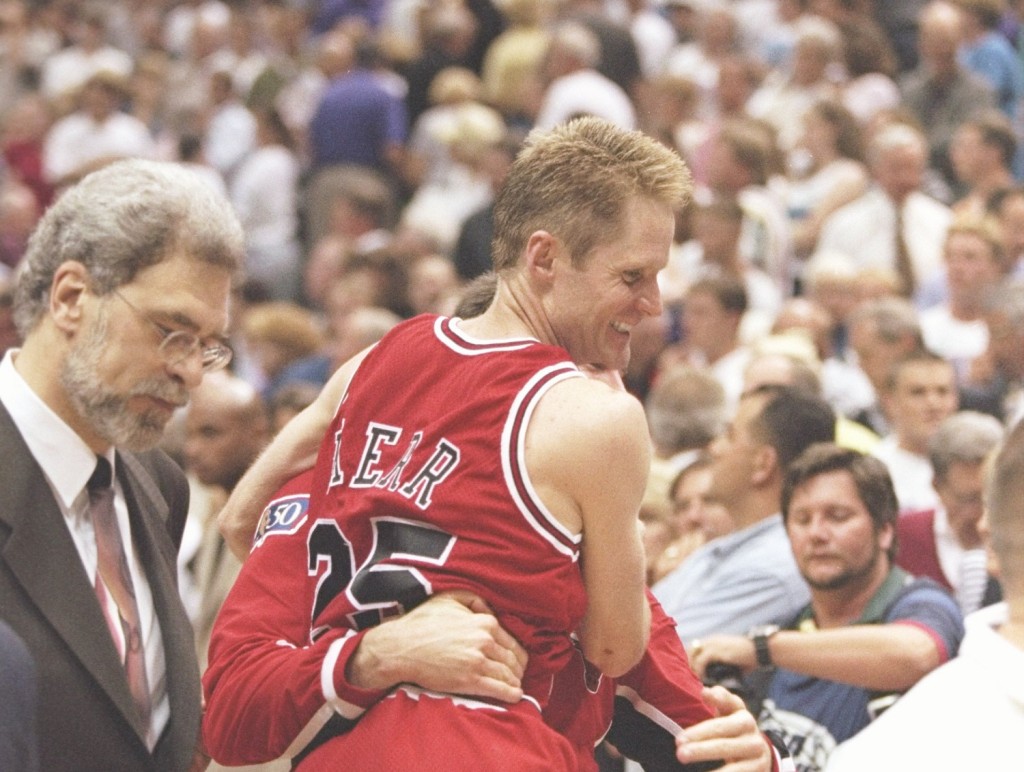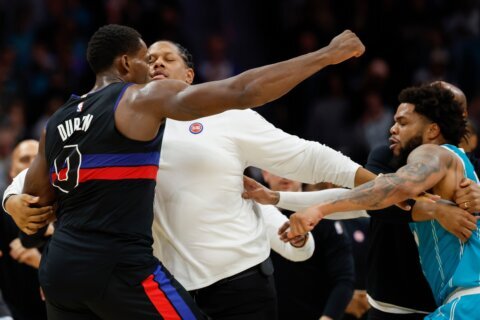WASHINGTON — It’s easy to be positive when you’re winning. But what if the perceived cause and effect between winning and attitude are backward? Could a culture of positivity foster a championship legacy?
Aside from the increasingly mythical acts of their transcendent superstar Stephen Curry, the Golden State Warriors have emerged as one of the great teams in the history of professional sports thanks to a culture change brought about by a coaching staff with deep roots cultivated in the power of positive thinking. Both Steve Kerr and — in his absence for the first half of the season — Luke Walton have displayed this largely levelheaded, positive approach and seen it pay great dividends.
The idea of the screaming, maniacal coach required for success is embedded deeply in American culture. Beyond that, it is celebrated, from Vince Lombardi’s most famous quote (“Winning isn’t everything — it’s the only thing”) to the seminal “There’s no crying in baseball!” scene from “A League of Their Own” (warning: language).
Somewhere along the way, compassion became associated with being soft, two-way communication interpreted as a lack of leadership. Social science has shown us that humans tend to attribute more intelligence to a person being negative. But a handful of basketball coaches have been succeeding with the opposite methodology, particularly Phil Jackson at the NBA level (11 championships) and Lute Olson at the college level (781 wins, 5 Final Fours and a national title).
When Jackson’s Chicago Bulls won in the ’90s, it was understandable that some overlooked his Art of Zen as secondary to the transcendent talent of Michael Jordan, without whom the team never won a title. But when Jackson went on to win again in Los Angeles, eventually breaking Red Auerbach’s career championship mark, it was clear there was something greater going on.
Both Kerr and Walton have a shared history of playing for Jackson. But their parallel paths extend further back than that. Each also played for Olson at the University of Arizona. So it makes sense that this coaching tree has ties that weave through something called the Positive Coaching Alliance.
***

PCA has been around since 1998, where it was founded at Stanford University, right around the time Kerr, as a player, was moving from one championship team in Chicago to another in San Antonio, and while Walton was committing to his future college career at the University of Arizona under Olson.
Jim Thompson, founder and chief executive officer of PCA, began his career as a teacher’s aide in St. Paul, Minnesota working with emotionally disturbed children. It wasn’t until he was enrolled at Stanford business school and his son began competing in youth sports that he became aware of how widespread negativity from coaches and parents was hampering not only kids’ enjoyment of the games they were playing, but also their ability to succeed.
Don’t be fooled — PCA wasn’t created for the purpose of making everyone feel warm and fuzzy, about celebrating every player equally (“we’re not big on participation trophies,” says Thompson).
A self-described “enthusiastic but mediocre athlete” who played one year of college basketball, he decided to jump in and try to apply some of the methodology he had learned along the way to try to bring out the best in youth athletes.
“It wasn’t just about stopping the negative,” he says of his first year of coaching, stressing how important it is to simply reaffirm kids when they do things the right way. “Kids were aggressive, because they weren’t afraid of making mistakes.”
And his teams started winning. Pretty soon, parents were asking if their kids could join his team for the next season.
“This wasn’t originally about character,” says Thompson. “It was about performance.”
Even if a Little League game doesn’t matter on a grand scale, it certainly matters to the kids playing. Thompson believes that the fact that the game does matter, that there are stakes, is what makes youth sports such a great tool for teaching about taking on challenges, about success and failure.
“Challenge and fear makes youth sports a great character building opportunity,” he says, but with a caveat. “If you have a great coach.”
***

Thompson has known Jackson for years, ever since the two were introduced by a mutual friend who sent Jackson one of Thompson’s books. Jackson reached out and the two bonded over their love of basketball, their shared North Dakota roots and their similar methodologies. So when Thompson asked the legendary coach to be the national spokesman for PCA, he was happy to do so.
Fittingly, it is through Jackson that Thompson first met Kerr, at Jackson’s induction into the Basketball Hall of Fame in 2007. Kerr had just been named president of basketball operations and general manager of the Phoenix Suns, still seven years away from becoming an NBA head coach. Nevertheless, Thompson developed an appreciation for Kerr’s sensibilities.
“I’ve had a very high regard for Steve for a long time,” he says.
But when Kerr was hired in Oakland, he took on an official role as a National Advisory Board Member for PCA, and took part in a Q&A last fall, when the Warriors were sprinting out to a surprising start to the season. In that talk, he spoke of the importance of inclusion of not only the rest of the coaching staff, but the players themselves when making decisions.
“One of the things that was pretty common with the best coaches that I played for was that it was a collaborative effort,” Kerr said at the time. “I think players appreciate that, and they see strength when coaches do that, rather than weakness. Because nobody has all the answers and you want to empower all your players.”
This was last season, when the Warriors were off to a surprising 15-2 start. Since then, the Warriors have gone 104-18 in the regular season and won the NBA title last season without being pushed to a Game 7 in any of their four playoff series. At home in Oakland’s Oracle Arena — a den of frenzied optimism that often swells in support behind its home team, rising as one when it needs a basket or a big defensive stop — they have won 57 of 58, including 42 straight.
They accomplished some of that without Kerr on the floor, as he recovered from a pair of back surgeries this offseason. Walton took the reins as acting head coach and the team never missed a beat, opening the season 39-4 before their head coach returned. Walton’s biggest imperative was trying not to disrupt what had already proven to be a successful formula.
“We as a staff thought it was important to keep that flow going that Steve had, because it obviously is a good thing, because we won a championship with it,” he said after the Warriors’ recent win in Washington. “So it wasn’t like it was hard to do, but we’d talk about it. ‘How do you think Steve would handle this situation?’ And we’d make decisions based on that.”
Walton says that both Olson and Jackson would never lose their cool when they would get upset. It’s a key component of what he’s learned and implemented on Kerr’s staff, the result being a team that is fully bought in, fully invested in each other’s success.
“From my perspective, I think it’s a uniquely healthy environment we have here.”
Kerr shared an example of that in his Q&A. Coming off a one-point win the night before against the Orlando Magic, he admitted that it was Leandro Barbosa, a bench player not even in the game for the final sequence, who suggested in the huddle that Kerr put the tallest man on his roster, Andrew Bogut, to guard the inbounds pass, making it as tough as possible for the opposition to create an opportunity for a game-winning shot. Kerr realized Barbosa was right, put Bogut on the ball, and the Warriors won.
He was more than happy to take the advice and to heap the praise for the decision on his player.
“Leadership is really a team sport,” says Thompson. “You share the power and the credit.”
***
The tide is turning against the old school methodology of negative coaching. Last year, Sports Illustrated asked if the era of abusive college coaches was coming to an end. If Kerr, Walton and company continue to set the model, it may be so.
“There’s a kind of sea change, almost,” says Thompson. “There’s a better way of getting the best out of kids.”
For his part, PCA continues to grow and thrive, expanding to 65 employees and running 2,500 workshops around the country this year.
“Our goal is to change the culture of youth sports,” Thompson says. “That requires a movement of people at the grass roots level and at the thought leader level.”
If Thompson is leading the grass roots charge, those like Kerr and Walton that are doing so as thought leaders. As the men in charge of the most dynamic, exciting team in sports today, they are on display to the nation every day, with inside-the-huddle camera shots broadcasting their coaching style to the world.
“It seems like this happens every time we play these guys,” said Kerr matter-of-factly with a shrug during the first timeout after the Warriors dug themselves a quick 12-point deficit against the Oklahoma City Thunder Saturday night. He quickly got back to focusing attention on his team’s effort level, and kept his composure despite a lackluster first half.
A reported halftime outburst in the locker room by emotional leader Draymond Green, something that may have torn other teams apart, already down double digits on the road against one of the league’s best teams, only seemed to further galvanize the Warriors. Even when Curry turned his ankle in the third quarter, causing the sport to hold its collective breath, the team kept within striking distance.
Down 11 with less than five minutes to play, the Warriors rallied around their defense, slowly closed the gap, forced overtime in a way only they could, and won in spectacular fashion at the buzzer.
“One of the things that’s important in sports is to try to detach yourself from outcomes,” says Kerr. “But it’s hard with all the judgment you get on a daily basis.”
Thankfully for Kerr and the Warriors, they haven’t needed to. But surely there will be harder days ahead. That’s why the process of unyielding optimism, of always building up his players for the next challenge, rather than tearing them down for any failure, remains the most important aspect of his job. And its why he makes the perfect model for the present and future of youth sports.
“When you’ve got someone like Kerr right now, showing almost relentless positivity, it’s fabulous,” says Thompson. “We want high school coaches, youth coaches to understand that positive emotions can create an upward spiral. What builds resilience is positivity.”






